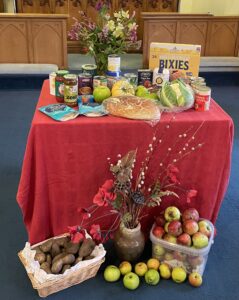 18th Sunday after Trinity Harvest Festival
18th Sunday after Trinity Harvest Festival
Today we celebrated our Harvest Festival. We warmly welcomed Hugh to play for us as we enjoyed the traditional harvest hymns and one or two new ones to familiar tunes.
Many thanks to those who braved the rain and the floods yesterday to help decorate and clean the church. After a couple of hours of hard work much was achieved.
This Week
Tuesday 10am – Prayer Group in the Garden Room
Thursday 10am – Said Holy Communion followed by coffee in Friendship House.
Wednesday 11th October 10.30 am Funeral Mary Finlayson Cairns Church
Coming up
Saturday 21st October – church walk. Meet at RSPB car park, Gartocharn, walk to loch Lomond
Sunday October 22nd AGM in church following Sung Eucharist and coffee.
Readings for next Sunday – 19th Sunday after Trinity – Isaiah 25:1-9 Philippians 4:1-9 Matthew 22:1-14
Today’s readings – Isaiah 5:1-7, Philippians 3:4b-14, Matthew 21:33-end
Harvest festival is traditionally a time of thanksgiving. We particularly give thanks for our food and for all who work hard to bring it to us. We also give thanks to God for his creation, our world, the beautiful country we live in and our part in maintaining and sustaining it.
Throughout the gospels Jesus conducted much of his ministry in countryside. In recent years we have been encouraged to take more interest in the country in terms of wildlife and agricultural practices. We are called to nurture our environment.
This week the church celebrated the feast of St. Francis of Assisi. St. Francis is remembered by most of us for his great love of all of God’s creatures, and for creation itself. He was also known for his great passion for the church and for the Gospel, and for bringing the church back to its main purpose of proclaiming the Good News of God’s love to all people.
He also practiced a great passion for prayer. He would spend hours in prayer before our Lord. And when he did, he would often pray a very simple prayer: “Who are you, God? And who am I?”
Today’s gospel reading – along with many of the parables told by Jesus throughout the gospels – serves to answer those questions because Jesus’ parables were stories designed to teach us about God, and about ourselves.
In today’s parable, we are told of a landowner who has planted a vineyard, leased it to tenants, and gone to another country, this landowner reminds us that God is the ultimate landowner, and we are merely his tenants. That’s why we as Christians understand ourselves to be stewards of God’s creation, rather than owners.
The tenants of the vineyard killed the servants who came for the produce. The landowner sends more servants. The tenants treat them the same way. Then, the landowner sends his own son. The landowner is hoping that the tenants will finally get the point that he hasn’t forgotten about this vineyard and that the fruit is important enough to him so that that he’s going to send his own son to collect it. He doesn’t send anyone with the son, which perhaps would have been wise. He sends his son alone with the hope that the tenants will respect him. But of course, they don’t. They kill the landowner’s son, so that they can inherit the vineyard for themselves.
It’s clear that the son is really Jesus, sent by God to proclaim the coming of the Kingdom and to proclaim his word. The servants whom the master sends to the vineyard clearly represent the succession of prophets who were sent to a rebellious Israel. The tenants represent Israel’s leaders who kill him rather than acknowledge the master’s claims. In Mark’s version the son is killed and then unceremoniously dumped outside the vineyard. In Matthew’s version the son is taken outside the vineyard and then killed, corresponding to the actual sequence of events of Jesus’s passion.
Jesus then reinforces the meaning of this parable by his reference to the stone that the builders rejected becoming the cornerstone with a clear implication that he is that cornerstone. The meaning we can take from this is that if the kingdom of God is rejected, it is then offered to others.
We need to remember that Christianity is always an invitation. God invites us to have a relationship with him, he doesn’t force us. In the same way Christ invited people to follow him and listen to him and if they didn’t respond he moved on to the next village.
But the fact is Christ is our cornerstone, the rock on which we build our lives. He is the foundation on which everything is built. To defy him is in the end to lose out on the richness and fullness of life which Christ brings to us and offers to all people.
Who is God? Who are we? These questions, asked by St. Francis, are answered in many and various ways throughout God’s word. Today as we celebrate harvest, we reflect on the fact that God has given us a beautiful vineyard to care for, but it’s not our vineyard. God asks us to care for his vineyard, to use what we have been given to bear fruit in our lives, not just for ourselves, but for God.
In a moment we will receive the Eucharist – the word itself meaning thanksgiving – and we will in the presence of Christ gives thanks for each other, for our harvest and for this great holy mystery which transcends all our earthly needs and uncertainties and directs us to the kingdom and our ultimate salvation.
